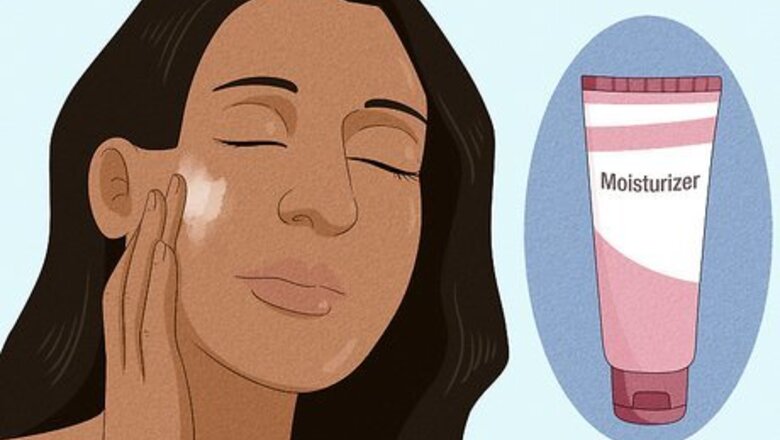
views
X
Research source
Putting on Your Face
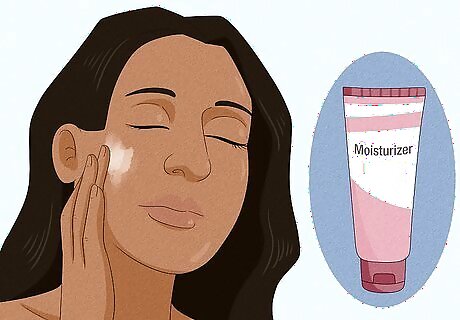
Keep your skin moisturized. Dark skin tends to take on an "ashy" look when not properly moisturized. To keep from taking on an unhealthy-looking gray cast, always apply a moisturizer to your face after your daily shower. If you have dry skin, you may want to use a liquid or cream foundation. For added hydration, you can mix a few drops of moisturizer into your foundation before you apply. Just be aware that this will lessen the coverage. You can also use a tinted moisturizer or bb cream for a dewy finish and translucent coverage. If you have oily skin, apply a mattifying primer on your oily spots, like your T-zone.
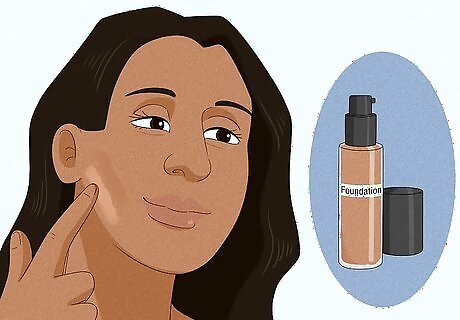
Match your foundation to your skin tone perfectly. If you choose to make foundation a part of your beauty routine, it's important to find a product that's as close as possible to your natural skin tone. When shopping for foundation, swatch it against your forehead or jawline. It's common for people with dark skin tones to be a little lighter at the face, so using your hand may not give you an accurate match. In some cases, you'll need 2 foundation colors—one for the center of your face, and one for the outer edges. Color match the lighter foundation to the apples of your cheeks and match the dark foundation to your jawline or chest. You can also use these colors as your contour. You can also go to a local beauty shop or the makeup counter at a department store and ask for help there. These businesses often employ skilled makeup artists who might be better able to find the perfect match. Many will also offer a free makeover with your potential new foundation to help you decide. You should make sure the foundation you're thinking about buying is perfect in all lights, not just under the ones in the store. Try shopping without foundation or concealer on your face when trying out new foundations. Go outside and use a hand mirror to make sure the product blends in perfectly in the sun.
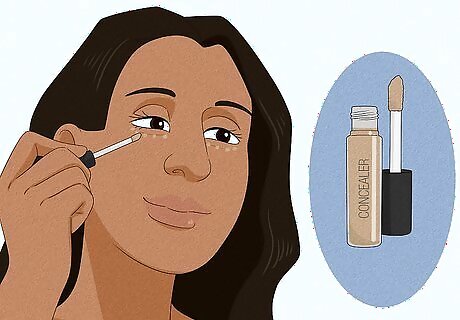
Conceal dark under eye circles. Dark under eye circles are common in people of Indian descent. They are caused by an excess amount of melanin being deposited in the skin, which is a process controlled by genetic predisposition. If you have these dark under eye circles, you may want to take extra care to cover them, as an even skin tone will give you a more youthful, vibrant look. Pick a concealer that is the same shade as your natural skin tone or 1 shade lighter. It should have a slightly warmer undertone. To apply, swipe the concealer under your eyes and blend at the edges. Try applying orange color-correcting concealer under your skin-tone concealer. Orange concealer is applied the same way as conventional concealer and helps make under eye circles disappear. In addition, it is a great all-around color corrector for blemishes on dark skin. You can also use concealer down your nose, on your Cupid's bow for a highlight, or anywhere you need more coverage.
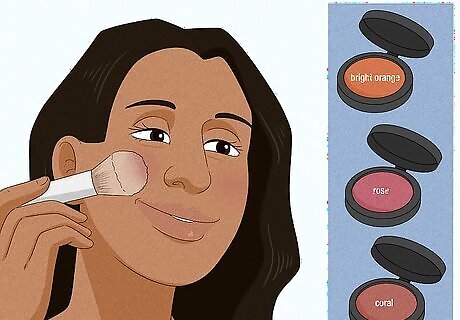
Use bold blushes. Many blushes that look too bright to be used in everyday makeup on lighter skin actually blend beautifully into dark skin. Bright oranges are especially great for adding a touch of color to your cheeks if you have warm undertones. More subdued colors like rose and coral also complement dark skin nicely. These are great choices for daytime looks. For nighttime makeup, consider using deep, rich colors like plum, wine, and bronze. The metallic in bronze blush is particularly great for creating a healthy glow. Avoid neutral browns and beiges. These tend to make already brown skin look dull.
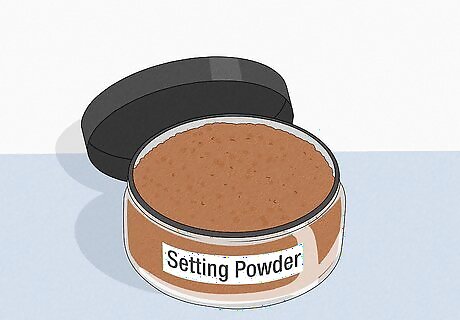
Finish your routine with a setting powder. You can use a powder that matches your skin tone or one that is translucent and matte. Setting powder will both help your makeup last longer and reduce shine. This step is especially important if you have oily skin. Be cautious when using illuminating powders or "illuminators." Make sure it has been especially formulated with dark skin in mind. These contain warm gold tones that will prevent the ashiness that other illuminators can give to dark skin.

Consider skin lightening treatments if you want lighter skin. While tanning is the trend in Western cultures, skin "bleaching" treatments are incredibly popular in India, especially among women with dark skin. It's best to stick to natural methods of lightening your skin, as many pharmaceutical products can have dangerous side-effects. Examples of natural skin lighteners that some people find effective are lemon juice, turmeric, and dairy products. The best way to make your skin a little lighter is to avoid sun exposure and to apply sunscreen when you can't. Bleaching your skin is by no means necessary. Dark skin is beautiful in its natural state. Don't lighten your skin to conform to some beauty standard. Only do so if it's your own personal preference.
Complementing Your Eyes
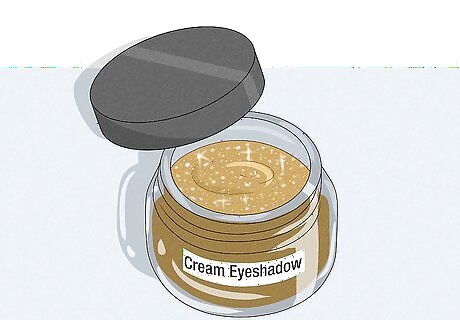
Highlight your brow with a dab of tan or cream eyeshadow. Using an eyeshadow brush, apply just a bit of tan or cream eyeshadow under the arc of each of your eyebrows. This will create the illusion of a more dramatic brow and bigger eyes. This trick is especially effective on dark Indian skin.
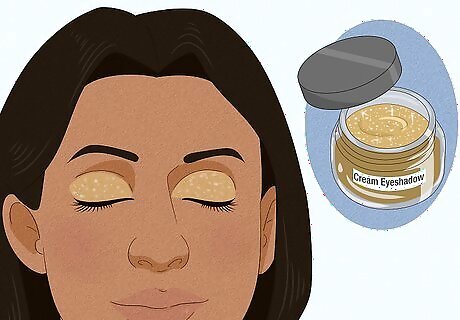
Try a base of cream or pale gold eyeshadow during day. While not usually thought of as a traditional look in India, shimmery cream or pale gold eyeshadow used as a base on the lids make a great everyday makeup choice for dark skin. When properly blended, this eyeshadow can look natural on dark skin while highlighting the eyes. A touch of cream or pale gold eyeshadow by your tear ducts can also make your eyes look brighter without covering the entire lid. Remember that dark complexions can pull off all colors. Just choose a dark shade of the color you want to try. Feel free to explore any eyeshadow that suits your tastes.
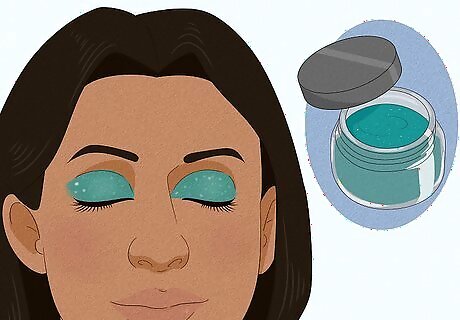
Choose vibrant hues of your favorite shades. Although you can wear any color, the best colors for dark skin are highly pigmented. Use an eyeshadow brush to dab the color onto your lid. Start near the inner corner of your lid and work your way to the outer corner of your eyelid. Bring the color up just over the crease. For example, violet, teal, fuchsia, and red all look lovely. You can also experiment with metallics. If you have warm undertones, choose colors that are based on a red/orange palette. For example, you could choose a dark orange shadow or a warm red. If you have cool undertones, choose colors that are based on a blue palette. For example, you could choose a bright indigo or a red mixed with blue hues.
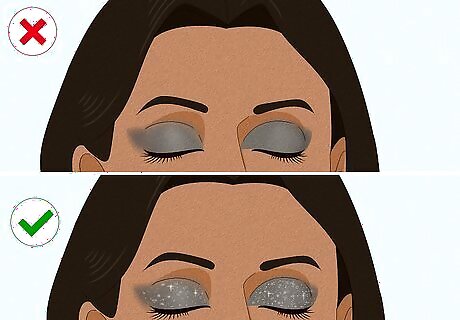
Be careful with nudes and ashy colors. Nudes can make you look washed out, and ashy colors can make your skin look dry and dirty. If you want to wear a nude shadow, choose one that is metallic or has a shimmer.
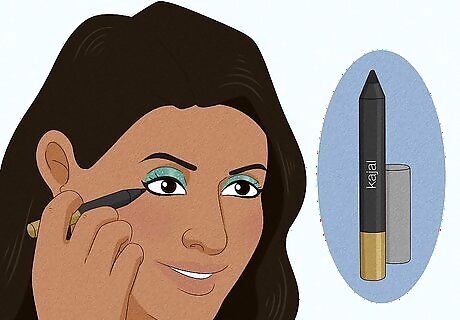
Use kajal to make your eyes pop. Lining the lower eyelids with kajal (either from homemade powder or a commercial stick) is a ubiquitous look in India. This tradition began with a belief in kajal's medicinal properties, but many people around the world now use kajal for purely aesthetic reasons. You can also use kajal to give yourself smoky eyes. Smoky eye makeup is another classic choice for Indian skin of all shades, but it is especially stunning when paired with dark skin. Heavy black eyeliner looks much less stark and more flattering on dark skin. People with lighter skin have more difficulty pulling off this look, especially when lining their lower eyelids. Liquid eyeliner is another staple of Indian fashion, both in India and among people of Indian descent living abroad, that looks great with dark skin.
Adding Lip Color
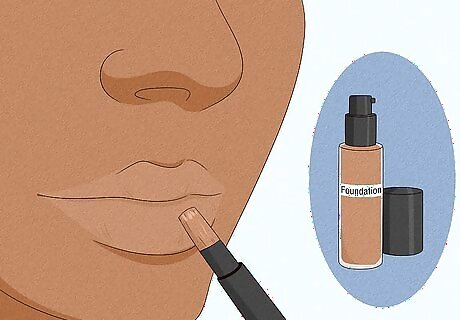
Apply some foundation first to make your lip color pop. Simply spread on a layer of foundation the same way you use it on the rest of your skin. This trick helps when applying brighter lip colors to dark lips. Otherwise, these colors may not show up very well. Foundation will also help your lip color to last longer. You can also use concealer or lip primer instead of foundation.
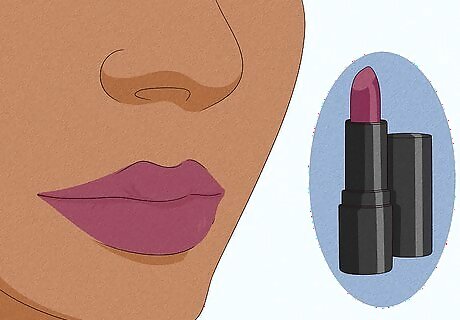
Use burgundy lip colors as a go-to. This deep red suits all complexions and is a staple part of many Indian women's makeup regime in India and abroad. It is especially flattering on dark skin, as it is typically not far off from one's natural lip color. Unlike people with paler complexions, if you have dark skin, you can pull off burgundy as an everyday lip color without looking overdone.

Try bright reds when you want to look glamorous. While much more bold and adventurous than burgundy, bright reds also pair well with dark skin. Orangey "fire" red shades are great for bold daytime makeup. Use cooler and more neutral bold reds for a dramatic nighttime look.
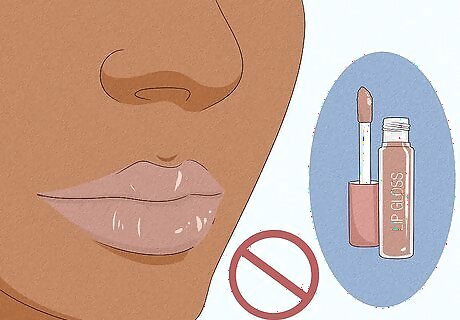
Stay away from pale and glossy lip colors. While they may look great as blush and eyeshadow, these colors don't work as well when used as lip colors. They can make your skin look dull and lifeless. Lip colors that are very glossy, frosty, and shimmery can cause the same issue. When you do choose to go pale and glossy, favor pinks and corals with intense rather than muted hues.




















Comments
0 comment